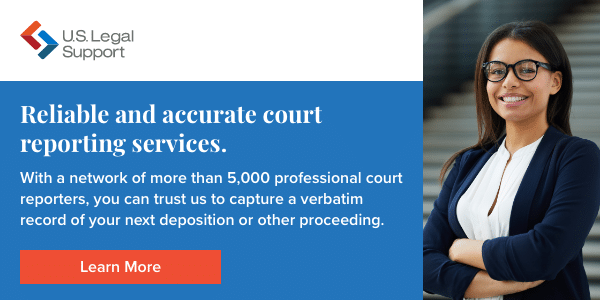Preventing Deposition Misconduct

Given how critical depositions are to the legal process, it stands to reason that fair deposition practices are paramount to a legal team’s success. However, several forms of unethical and unfair conduct can emerge during depositions, whether or not witnesses or counsel are engaging in them intentionally.
Avoiding deposition misconduct gives clients the best chance at optimal outcomes and prevents other long-term issues like reputational damage.
In this guide, we’ll explain what deposition misconduct is and why it matters, how it often manifests during a proceeding, and how to avoid becoming either a perpetrator or a victim.
What is Deposition Misconduct?
Deposition misconduct is a broad term that describes a wide range of actions taken during or before a deposition that compromise its fairness and ethics. Specific instances vary with local rules and precedents, but most have to do with some combination of an attorney or witness disobeying them, intentionally or otherwise.
And, while intention can be hard to identify, the biggest reason why these practices need to be avoided and prevented is that their outcomes can be detrimental to all parties involved.
In practice, most deposition misconduct stems from attorneys or witnesses behaving in a way that is either explicitly disallowed or for which there is no extant authorization or justification.
For example, consider counsel instructing deponents not to answer a deposition question. This is usually permitted for preserving established privileges, enforcing court-ordered limitations, or avoiding bad-faith or oppressive questions.1 Under these circumstances, such guidance would likely be permissible. But, absent one of these conditions, the attorney may be engaging in deposition misconduct.
Why Does Deposition Conduct Matter?
Most forms of deposition misconduct are disallowed because they can give their users an unfair advantage if unchecked. They allow attorneys to get things out of witnesses that they shouldn’t be able to or create muddy waters where facts should be clear. Being on the receiving end of deposition misconduct can mean facing a much harder legal battle than you should have to.
However, these actions also have negative consequences for their perpetrators when they’re recognized and addressed. Impacts of deposition misconduct for the ones conducting it include:
- Sanctions – Attorneys can have evidence dismissed from a case, and witnesses can have their claims dismissed. In some cases, both parties can be fined a sanction.
- Logistical hurdles – Inappropriate behavior can extend legal battles both by itself (i.e., excessive deposition objections) or indirectly through processing motions to intervene or address it.
- Poor legal outcomes – Attorneys or witnesses who engage in misconduct could see key pieces of evidence or testimony dismissed, resulting in unfavorable results for them.
- Reputational damage – Engaging in misconduct, especially repeatedly, can create a negative association with an attorney and their firm, jeopardizing future success.
In some jurisdictions, the stakes of deposition misconduct are growing. For example, in Clark County, Nevada, witnesses and attorneys can be sanctioned for engaging in some of the most common forms of deposition misconduct.2 Similar rules and precedents exist nationwide.
Common Types of Deposition Misconduct
Avoiding and preventing deposition misconduct starts with knowing what it looks like in practice to ensure your legal team doesn’t engage in it and knows how and why to call it out if it does happen to them.
Here are some of the most common kinds of deposition misconduct to look out for:
Problematic Witness Answers
Of the kinds of deposition misconduct that expose witnesses and attorneys to sanctions, one of the most common is problematic answers from witnesses. In particular, witnesses can’t2:
- Answer in a non-responsive or impertinent manner
- Refuse to provide estimates
- Feign a lack of knowledge during deposition questioning
If they’re found to be answering or avoiding questions in these ways, they may be engaging in misconduct and become subject to a sanctions motion.
By extension, attorneys encouraging these kinds of (non-) responses from deponents is inappropriate and may be considered misconduct, exposing them to sanctions as well.
Avoiding this kind of misconduct comes down to open and honest communication with deponents about what they can and must say in their answers. Preventing it from happening to you requires research into what information opposing counsel may be privy to.
Inappropriate Counsel Objections
Another common sanctionable form of deposition misconduct, at least in some jurisdictions, is inappropriate objections from counsel.2 The most obvious example is when attorneys make excessive objections or object to things that they know (or should know) are not objectionable. These kinds of objections create obstructions that disrupt legal processes, create confusion, or potentially influence witnesses to answer differently or avoid answering.
Avoiding this kind of misbehavior requires understanding the rules and precedents for what constitutes a sound objection in a given jurisdiction. As a best practice, legal teams can research what kinds of objections a given judge or legal system tends to grant and which they find inappropriate.
On the other end, legal teams need to be vigilant about raising concerns when their opponents’ objections are getting out of hand. Letting objections run wild could swing a case against you.
Unethical Influence on Witnesses
Another very common and well-known form of deposition misconduct is unethical witness influence by attorneys. It’s referred to as “coaching,” and it is explicitly disallowed.
The ABA’s Formal Opinion 508 addresses three kinds of unethical witness preparation3:
- Unethical pre-testimony witness coaching – Attorneys cannot guide a witness to answer dishonestly, nor can they “program” what kinds of answers or framing witnesses should provide.
- Unethical conduct during testimony – Attorneys cannot communicate approval, disapproval, or other cues to witnesses through covert gestures (i.e., winks, kicks).
- Unethical conduct in remote settings – Attorneys cannot communicate covertly with witnesses during remote hearings to influence answers (i.e., text messages off-screen).
Steering clear of these issues requires vigilance, both in terms of preventing them from happening to you or engaging in it (or appearing to engage in it) yourself. Practicing proper witness preparation techniques with clients can help avoid the potential for unethical influence.
Improper or Offensive Conduct
Last but not least, attorneys and witnesses need to abstain from unprofessional conduct that directly offends any parties or creates a hostile environment during depositions. This is a nebulous category, but bigotry, direct attacks, threats, and uncivil language or gestures can create an environment that jeopardizes the legitimacy of a hearing.
Prepare your client on offensive conduct and how to avoid these kinds of actions, especially in an emotionally or otherwise charged legal matter. It’s equally important to call out offensive, inappropriate, or unprofessional conduct from opponents, if for no other reason than to establish that it won’t be tolerated.
Best Practices to Ensure Proper Deposition Conduct
There are two main components to ensuring proper deposition conduct. On one level, you need to be taking steps to avoid engaging in misconduct by understanding and abiding by all applicable trial court rules and regulations. On another level, you also need to be on the lookout for signs that opposing legal teams are engaging in deposition misconduct that could impact your case.
Below, we’ll walk through considerations and practices to keep in mind on both sides.
How to Avoid Engaging in Deposition Misconduct
For some of the examples above, avoiding inappropriate behavior is as easy as practicing fundamentals learned through years of legal education and practice. Refraining from offensive language should be straightforward for any professional in 2024.
However, other kinds of misconduct involve treading a fine line between savvy and unsavory behavior.
For example, knowing the tipping point between too many objections and just the right amount (or kind) can help to restrict a counsel or witness whose own line of reasoning is questionable at best. And, when it comes to witness preparation and coaching, there are a wide variety of tactics you should be using to prep witnesses outside of what you can’t do. For example, when preparing an expert witness for deposition, you should study their past work, outline things the opposition might say or ask, and make it clear to them what rights they have and what will be expected of them.
Identifying and Addressing Deposition Misconduct
What’s not as straightforward, in most cases, is identifying when your opposition is using these tactics against you and what you should do to stop them and/or mitigate the impacts.
To begin with, understanding applicable rules and precedents in a given jurisdiction is essential. You need to know exactly what attorneys and witnesses can do—where the line is that they can’t cross and how they might try to—to be able to point to the line when they do cross it.
You also need to actually address these things when they happen by documenting and objecting to them using the proper channels. And, for that, you need evidence of what happened. To that effect, having clear transcripts of exactly what is said and done during a deposition is a critical advantage. U.S. Legal Support offers a realtime feed during depositions, which gives legal teams access to the stenographer’s draft transcript during depositions rather than having to wait until the deposition is complete.
Ethical and Effective Depositions with U.S. Legal Support
Deposition misconduct is a double-edged sword. Legal teams that wield it, intentionally or not, are giving themselves unfair advantages by manipulating the norms of a deposition. But that can also come back to bite them if their opposition is savvy enough to address their tactics.
To learn more about how we can help, get in touch today!
Sources:
- The Legal Intelligencer (ALM). Crying Foul Over Attorney Conduct During Depositions. https://www.law.com/thelegalintelligencer/2024/01/29/crying-foul-over-attorney-conduct-during-depositions/
- Clark Country Bar Association. Red Flags: Deposition Misconduct and Judicial Remedies. https://clarkcountybar.org/red-flags-deposition-misconduct-and-judicial-remedies/
- ABA. Formal Opinion 508: the Ethics of Witness Preparation. https://www.americanbar.org/content/dam/aba/administrative/professional_responsibility/ethics-opinions/aba-formal-opinion-508.pdf

Editoral Policy
Content published on the U.S. Legal Support blog is reviewed by professionals in the legal and litigation support services field to help ensure accurate information. The information provided in this blog is for informational purposes only and should not be construed as legal advice for attorneys or clients.


